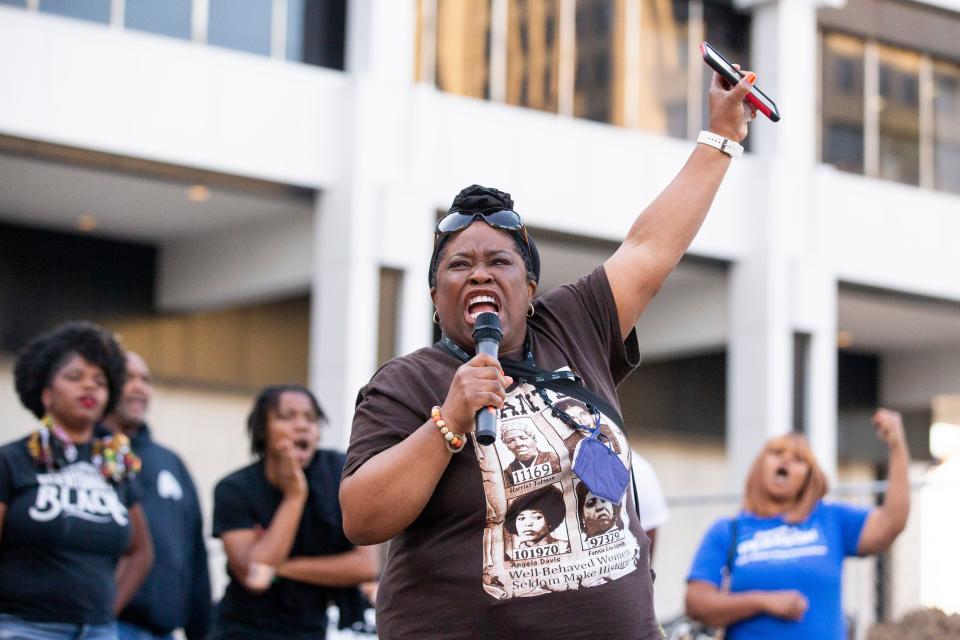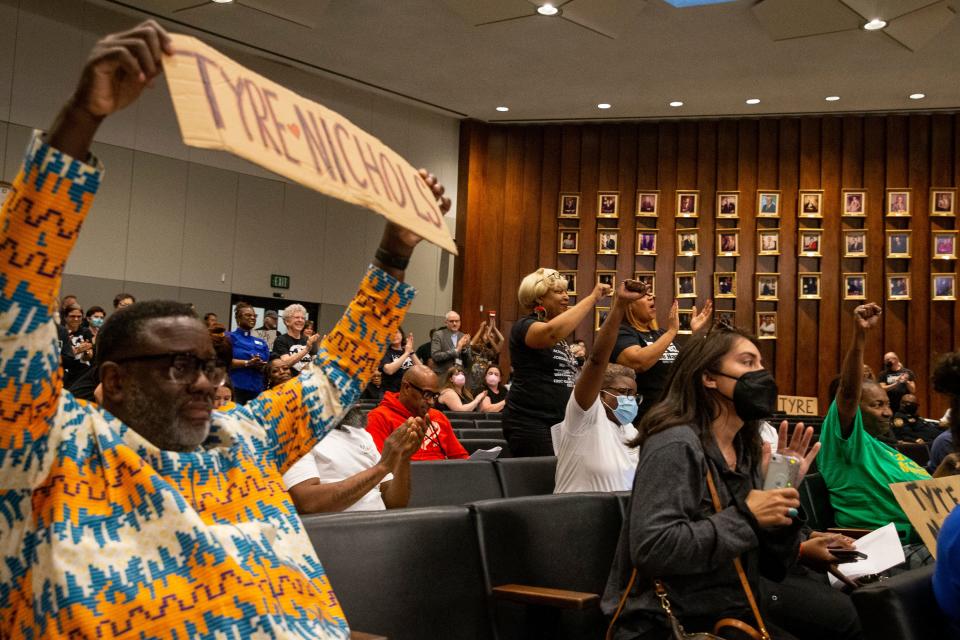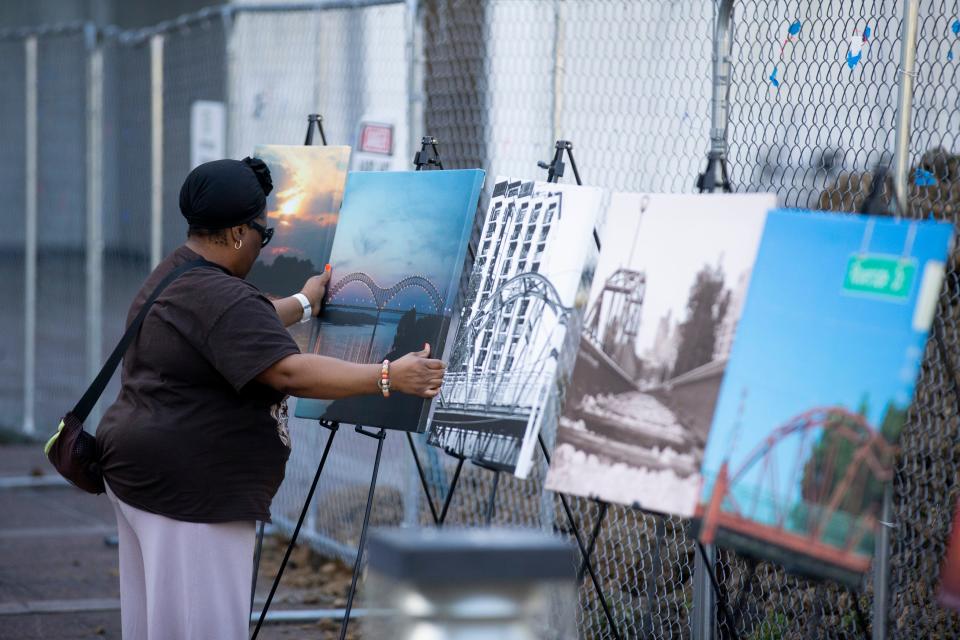In wake of Tyre Nichols' beating death, Memphis council orders police to halt traffic stops for minor offenses
In the wake of the brutal beating and death of Tyre Nichols earlier this year, police in Memphis will be directed to cease traffic stops for low-level offenses like improperly placed license plates or a single broken brake light.
City council members passed the "Achieving Driving Equality" ordinance on Tuesday, making the city the sixth in the country to pass a similar ordinance, according to Councilwoman Michalyn Easter-Thomas, its sponsor.
The ordinance was a win for advocacy groups who have pushed for its passage since the death of Nichols, a 29-year-old Black man who died three days after being beaten by Memphis police officers. Nichols was pulled over in a Jan. 7 traffic stop before officers forced him from his vehicle, tased, chased and beat him.
The ordinance still allows police officers to stop drivers for “primary violations” and when there are both a primary and secondary violation. However, they may not stop a driver for only a secondary violation.

The goal is to reduce interactions between police and the public and to allow police to focus on serious crimes, not “poverty crimes,” Easter-Thomas said.
Secondary violations are defined as:
Vehicles with expired registration within 60 days of expiration
When a temporary registration permit is improperly located but still clearly displayed
When the registration plate is not securely fastened but is clearly displayed
When a single light (including brake, head or running light) is out
Loosely secured bumpers
“What this ordinance is, is surrounding the idea of pretextual stops, how they aren’t helpful and how they divert resources away from our clearly intentioned needs in our community such as dealing with crime and aiding our citizens," Easter-Thomas said.
State law still takes precedence over a local ordinance. Memphis Police Chief Cerelyn “CJ” Davis told council members that state laws will allow officers to stop cars for secondary violations “if there is a situation that’s an outlier.”

It was the final ordinance supported by advocacy groups like Decarcerate Memphis and Memphis Interfaith Coalition for Action and Hope to be passed by the Memphis City Council.
During a council meeting, Rosalyn Nichols, an Interfaith Officer at the Metropolitan Inter-Faith Association (MIFA), asked the council to rename the ordinance the "Tyre Nichols Driving Equality Ordinance," which was supported by Nichols' family.
“As you well know, this ordinance will reduce the threat against citizens and the loss of life at the hands of police in the name of law enforcement," Rosalyn Nichols said. "This will be the first step for healing that starts as we begin to move as a community beyond the darkness of Jan. 7 as a model for our nation with Memphis leading.”
Easter-Thomas said she wanted to talk with Tyre Nichols' family before adding his name to the ordinance.
Another ordinance, which would have consolidated the previously passed ordinances on data transparency, traffic stops and more, was tabled indefinitely by Councilman JB Smiley after opposition from advocates and questions from council members as to whether it was redundant. That ordinance also included language from local police policy and the federal George Floyd Justice in Policing Act.
Smiley said Tuesday that the council's actions in passing multiple reforms set a standard for creating change.
“This council heard you all," Smiley said. "We implemented what we believed, what you all believed to be serious changes as it relates to criminal justice reform.”

Advocates call for change that honors Tyre Nichols
A day before City Council met, a group of about 40 community members gathered outside City Hall to remember Nichols’ life, 90 days after he died, and call for the passage of the driving equality ordinance.
“It shouldn’t be this hard,” said the Rev. Andre E. Johnson, senior pastor at Gifts of Life Ministries. “The justice for Tyre campaign has done wonderful work in bringing facts and figures and research about the atrocities of pretextual stops. It should not be this hard to get people to understand how Black folks are treated in this city. It should not be this hard to do what is right.”
A group of speakers stood in front of Nichols’ photography that had been printed onto canvasses. The pictures mainly consisted of sunsets over Memphis, a sight his parents said he would regularly set aside time to watch.
“Y’all see these beautiful works of art?” asked Trinity Williams, an activist and student at Rhodes College. “Every aspect of color, every aspect of creativity, every aspect of individuality is represented in his artwork. In the wake of his death, do you know what the officers did? They stepped on his artwork... They told him that his God-given talent was not worthy of being seen.”
Richard Massey, a student activist at the University of Memphis, said the ordinance should not be seen as a radical ask, and that minor stops can be predatory and lead to negative interactions with police.
“We’ve already seen this legislation in Los Angeles and Philadelphia…and now it’s being debated in Memphis,” Massey said. “It’s up in the air in Memphis as if it’s some kind of radical concept. We’ve demanded an end to pretextual traffic stops in order to ensure that people aren’t pulled over on the basis of their income because they can’t afford to fix their broken taillight at the moment. We’re demanding that dangling an air freshener, or graduation tassels, doesn’t serve as the precursor to the death of Black and brown people.”
Katherine Burgess covers government and religion. She can be reached at katherine.burgess@commercialappeal.com or followed on Twitter @kathsburgess.
This article originally appeared on USA TODAY NETWORK: Tyre Nichols: Memphis passes ordinance to end minor traffic stops

